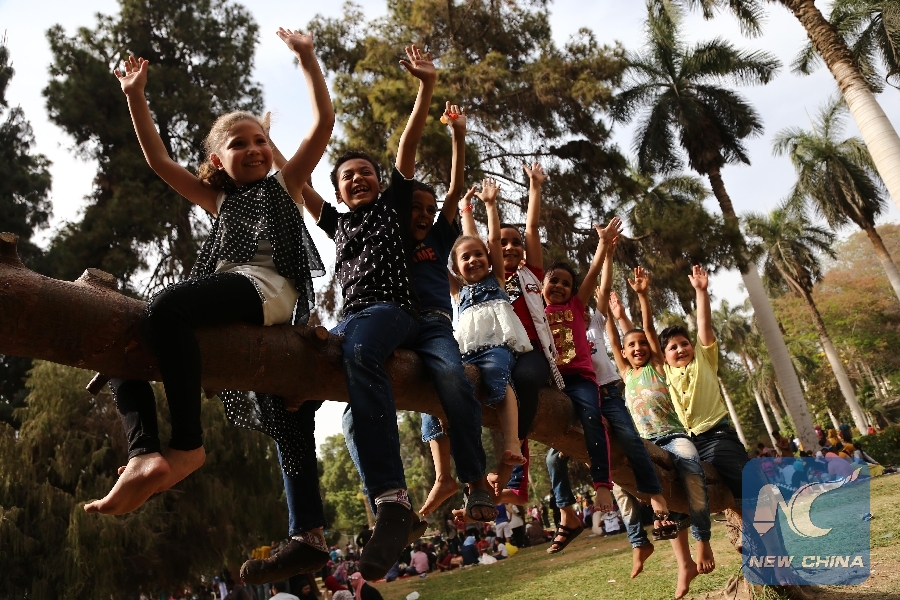
People celebrate Sham el-Nessim, a traditional Egyptian festival marking the beginning of spring, in Cairo, Egypt, April 29, 2019. (Xinhua/Ahmed Gomaa)
by Ahmed Shafiq
CAIRO, April 29 (Xinhua) -- Millions of Egyptians filled public parks, outdoor space, beaches, zoos and Nile cruises on Monday to mark ancient Egyptian spring festival, also known as Sham el-Nessim.
Early in the morning, Muslims and Christians nationwide flocked to their planned destinations to welcome the spring amid tight security measures in the North African country.
Sham el-Nessim, which means in English "breathing the breeze," is a one-day Egyptian public holiday marking the beginning of spring. It always falls on the Monday after the Eastern Christian Easter and is celebrated by Muslims and Christians alike.
The name of the holiday is derived from the Egyptian name of the Harvest Season, known as Shemu, which means a day of creation.
"I came from Luxor province to celebrate the spring festival in Cairo," Mohammed Mahmoud, a worker from Luxor told Xinhua as he enjoyed a sunny day with his friends at the famous Orman Botanic Garden.
Mahmoud said the garden is a favorite destination of his family for spending holidays, mainly the spring festival.
"It is also a good chance to show our love to our Christian friends," he added.
Not far away from Mahmoud, Um Krollos, a middle-aged Coptic lady, ate with her family the festival's traditional meal, salted fish.
During the feast, ancient Egyptians used to offer salted fish, lettuce and onions to their deities, a tradition that still is maintained by modern Egyptians.
"The festival cannot be a happy one without eating salted fish," the lady said, flashing a shy smile. "This festival is not only marked by the Christians, but also a major holiday for all Egyptians."
Watching her kids playing football, the lady said the festival was largely observed by Egyptians since the pharaonic era.
Egyptian authorities have bolstered security across the country during Easter Sunday and Sham el-Nessim celebrations on Monday respectively.
Many Egyptians believe that celebrating the festival in public gardens, beaches and open space delivers a message that the country is safe for tourists whose number has declined in the past few years due to security and political turmoil.
"When foreign media outlets report that millions of Egyptians are celebrating the spring festival safely, tourists will be more excited to come to Egypt, which used to be a preferred destinations to millions of Europeans," Ahmed Hosny, a carpenter from Cairo told Xinhua.
The man added that Egypt is already safe, but some foreign media aggravate the situation in their reports.
Tourism in Egypt, a main source of income, was heavy blown following the Russian airplane crash in North Sinai in October 2015, and flights were suspended to Egypt by several countries, including Britain and Russia.
Even before the crash, Egypt had suffered a sharp decline in tourism due to political turmoil, including two mass uprisings which toppled two former presidents, forcing several countries to ban their citizens from visiting Egypt for safety reasons.
Egypt also witnessed anti-government attacks killing hundreds of police and army personnel since the military removed former Islamist President Mohamed Morsi in July 2013.

